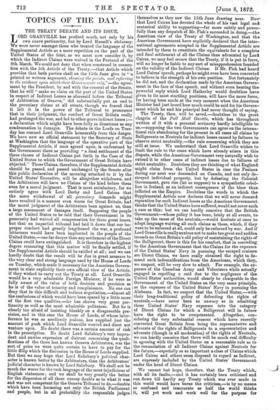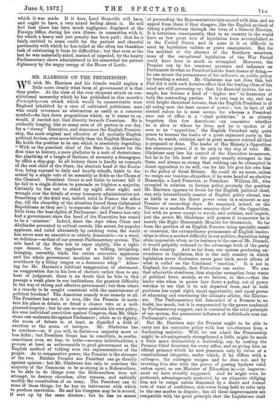TOPICS OF THE DAY.
THE TREATY DEBATE AND ITS ISSUE.
LORD GRANVILLE has profited much, not only by his own suave pertinacity, but by Lord Russell's obduracy. We were never amongst those who treated the language of the Supplemental Article as a mere repetition on the part of the United States of the feint, as we mast now consider it, by which the Indirect Claims were waived in the Protocol of the 8th March. We could not deny that when construed in connec- tion with the 5th Article of the Treaty,—that Article which provides that both parties shall on the 15th June give in "a printed or written argument, showing the points, and referring to the evidence upon which their Governments rely,"—the agree- ment by the President, by and with the consent of the Senate, that he will "make no claim on the part of the United States in respect of Indirect Losses as aforesaid bcfore the Tribunal of Arbitration of Geneva," did substantially put an end to the pecuniary claims at all events, though we feared that it left it in the power of the Tribunal to pronounce that in their judgment, the conduct of Great Britain really had prolonged the war, and led to other grave indirect losses ;- a declaration which might have been fully as disastrous as any condemnation in damages. The debate in the Lords on Tues- day has rescued Lord Granville honourably from this danger. We have now an official statement by the Secretary of State at Washington that the language of the operative part of the Supplemental Article, if once agreed upon, is understood by the Government there as providing "a final settlement of the three classes of Indirect Claims put forth in the Case of the United States to which the Government of Great Britain have objected." Those Claims, therefore, if the Supplemental Article should be passed, and passed unchanged by the Senate after this public declaration of the meaning attached to it by the United States' Executive, will be altogether withdrawn, and the Arbitrators will have no Claims of the kind before them even for a moral judgment. That is most satisfactory, for we entirely agree with Lord Derby and Lord Cairns that the mere withdrawal of all pecuniary demands might have resulted in a manner even worse for Great Britain, had the moral judgment of the Arbitrators been against us, than a large assessment of damages itself. Supposing the people of the United States to be told that their Government in its generosity had waived all compensation for these great losses, but that an impartial tribunal had laid it down that our im- proper conduct had greatly lengthened the war, a profound bitterness would have been implanted in the people of the United States,—one far deeper than any settlement of the Direct Claims could have extinguished. It is therefore in the highest degree reassuring that this matter will be finally settled, if the Supplemental Article should be ratified at all ; and we can hardly doubt that the result will be due in great measure to the very clear and strong language used by the House of Lords on Tuesday, which made it necessary for the American Govern- ment to state explicitly their own official view of the Article, if they wished to carry out the Treaty at all. Lord Granville would be a very admirable Foreign Minister, if he were as fully aware of the value of both decision and precision as he is of the value of tenacity and complaisance. No one can deny that in this difficult and tedious negotiation,—almost all the confusions of which would have been spared by a little more of the first two qualities,—he has shown very great per- tinacity as well as the most admirable politeness. But he is clearly too afraid of insisting blankly on a disagreeable pre- cision, and in this case the House of Lords, of whose inter- ference he was so needlessly jealous, has supplied just the amount of push which Lord Granville wanted and durst not venture upon. No doubt there was a certain amount of risk in the prescription. No doubt Lord Salisbury's very impru- dent and unwise expression of distrust concerning the quali- fications of the three less known Geneva Arbitrators, was the sort of price we Were quite certain to have to pay for the little fillip which the discussion in the House of Lords supplied. But then we may hope that Lord Salisbury's political char- acter is known better by the Arbitrators, than the Arbitrators' judicial character is known by Lord Salisbury. We shall not be much the worse for the rash language of the most injudicious of English statesmen ; and we shall be very greatly the better for the dispersion of all these uneasy doubts as to what it was and was not competent for the Geneva Tribunal to do,—doubts which have been harassing not only the British Parliament and people, but in all probability the responsible judges themselves as they saw the 15th June drawing near. Now, that Lord Cairns has devoted the whole of his vast legal and, oratorical ability to supporting—far more subtly and power-- fully than any despatch of Mr. Fish's succeeded in doing,—the American view of the Treaty of Washington, and that the American Government have explicitly declared that the inter-- national agreements accepted in the Supplemental Article are intended by them to constitute the equivalents for a complete and final settlement of all the Claims thus advocated by Lord Cairns, we may feel secure that the Treaty, if it is put in force„ will no longer be liable to any sort of misapprehension founded on the validity of the Indirect Claims. If Mr. Fish had heard: Lord Cairns' speech, perhaps he might even have been converted_ to believe in the strength of his own position. But fortunately he did not, and the declaration made by the American Govern- ment in the face of that speech, and without even hearing the powerful reply which Lord Hatherley would doubtless have given to its most startling positions, will have the more force, for having been made at the very moment when the American, Minister had just heard how much could be said for his Govern- ment which he and his principal had never thought of saying. The Treaty, then, will be saved,—doubtless to the great chagrin of the Pall Mall Gazette, which has throughout written of it with a personal acrimony hardly intelligible to- us,--supposing the two Governments can agree on the interna- tional rule abandoning for the present in all cases all claims by Belligerents on Neutrals for indirect losses caused by failures to observe strict neutrality,—the rule concerning which they are still at issue. We understand that Lord Granville wishes to limit the rule to the cases which have already arisen in this, dispute, while the American Government very naturally wish to. extend it to other cases of indirect losses due to failures of strict neutrality. Doubtless they are thinking of what Englandd might claim from the United States in case the Fenian& during our next war descended on Canada, and not only de- stroyed individual property, but by defeating the Colonial Government, gave rise (let us suppose) to a sympathetic rebel- lion in Ireland, as an indirect consequence of the blow thus- inflicted on the Empire. Doubtless the words in which the. Supplemental Article now declares that we will never demand. reparation for such Indirect losses as the American Government. thinks that the United States have suffered, would not cover such. a case as this; but we can hardly conceive that the British Government—whose policy it has been, lately at all events, to take up the cause of the neutrals,—would hesitate at once to-- adopt language waiving all such claims as these, which, if they were to be enforced at all, could only be enforced by war. And if Lord Granville is really anxious not to make too great and sudden inroads on Great Britain's old policy of maintaining the rights of the Belligerent, there is this for his comfort, that in conceding to the American Government that the Claims for the expenses of the United States' Navy in pursuing the escaped cruisers. are Direct Claims, we have really obtained the right to de- mand such indemnifications from the Americans, which they,. we suspect, will be very slow to admit. For example, the ex- penses of the Canadian Army and Volunteers while actually engaged in repelling a raid due to the negligence of the United States' authorities, would clearly be chargeable to the: Government of the United States on the very same principle, as the expenses of the United States' Navy in pursuing the Alabama. In fact, we suspect that the United States,—with their long-traditional policy of defending the rights of neutrals,—have never been so unwary as in admitting- these United States' Navy expenses into the category of Direct Claims for which a Belligerent will in future- have the right to be compensated. Altogether, con- sidering the very substantial reasons which have recently converted Great Britain from being the representative and advocate of the rights of Belligerents to a representative and advocate (though in all moderation) of the rights of Neutrals,. we can hardly conceive that there will be much real difficulty in agreeing with the United States on a reasonable rule as to. the renunciation of all Indirect Claims against Neutrals for the future,—especially as so important a class of Claims which Lord Cairns and others seem disposed to regard as Indirect,. are expressly included by the United States' Government under the head of Direct Claims.
We cannot but hope, therefore, that the Treaty which,. with all its faults,—and it has certainly been criticised and run down till hardly any Treaty which was ever made in this world would have horse the criticism,—is by no means so confused and inaccurate as half the world thinks it, will yet work and work well for the purpose for which it was made. If it does, Lord Granville will have, and ought to have, a very mixed feeling about it. He will feel that there has been much negligence displayed at the Foreign Office, during his own illness, in connection with it, for which a heavy and just penalty has been paid ; that he is fairly entitled to some credit for the patient and cheerful pertinacity with which he has toiled at the often too thankless task of extricating it from its difficulties ; but that even at the last he was materially aided, instead of impeded, by the hearty Parliamentary shove administered to his somewhat too patient diplomacy by the angry energy of the House of Lords.



































 Previous page
Previous page